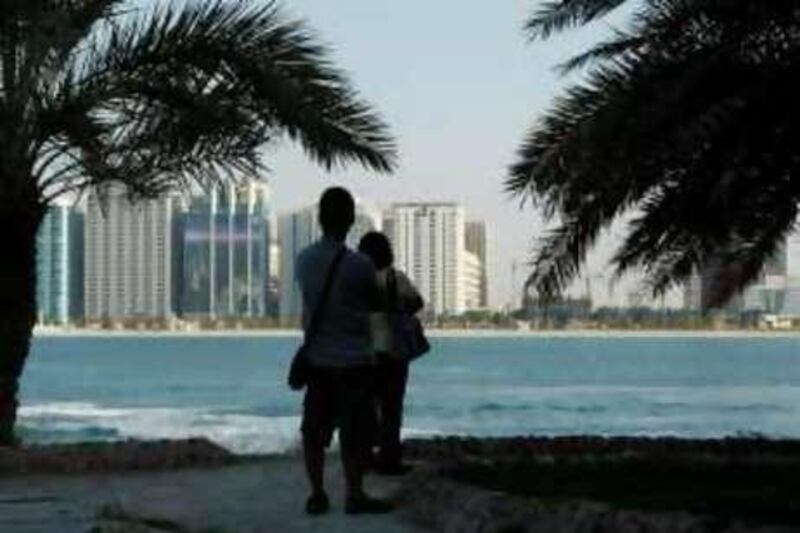NEW YORK // Tourism in the UAE is on track to weather the global economic downturn, with 7.6 per cent more visitors arriving than last year while the sector in other parts of the world is slowing down. The latest figures from the UN's World Tourism Organisation (WTO) indicate continued growth in the Emirates this year, with the wider Middle East ranking as a global "star performer" with an impressive 17.3 per cent increase. This compares favourably with Europe's increase of 2 per cent for the first eight months of the year - although this shrank to 1 per cent growth during the summer holiday season, when financial fears were mounting. "The Middle East has been having year-on-year growth in double digits - the figures for the first half of the year were 17 per cent, which is off the wall," said WTO spokesman Geoffrey Lipman. "Even though things may be grim everywhere next year, the reduction in the Middle East, particularly with the strong inter-regional traffic, may not be as severe as in some of the other regions. There is still a lot of wealth in the Middle East." Tourism chiefs are pushing hard to lure holidaymakers to sample the Gulf sunshine, and are building hotels, launching new Emirates Airline and Etihad Airways flights and expanding airports. Sheikh Sultan bin Tahnoon,, the chairman of the Abu Dhabi Tourism Authority (ADTA), this week revealed plans for the capital to offer more than 26,000 hotel rooms by the end of 2012. He said: "Eighty per cent of tourism in Abu Dhabi is business tourism and even at a time of economic slowdown, this segment does not get affected." The significant hotel expansion is part of the authority's five-year plan which aims to see 2.7 million guests visiting the capital's cultural offerings - such as the planned branches of the Louvre and Guggenheim museums - by 2012. Virginia Goff, deputy manager of promotions for the Dubai Department of Tourism and Commerce Marketing (DTCM), said a recent internal survey of bookings did not indicate a downturn. "All the indications are very positive. As you can see here, hotels are almost fully booked," said Eyad Abdul Rahman, the executive director of media relations at the DTCM. "And there are so many projects that Dubai has in the pipeline that will keep people interested in coming here." Dubai, which has set an ambitious target of attracting 15 million tourists by 2015, is faced with the challenge of constantly reinventing itself. Kerzner International's US$1.5 billion (Dh5.51bn) Atlantis resort opened on the Palm Jumeirah recently, attracting thousands of visitors from around the world, said Mr Abdul Rahman. "And we have more projects like Dubailand which will attract more tourists." Rotana, an Abu Dhabi-based hotel group, appears equally confident in continued growth in the Emirates, defying the economic downturn by unveiling plans for a dozen hotels in Abu Dhabi. Selim el Zyr, the president and chief executive of the hotel, said the GCC and wider Middle-Eastern markets had not faced difficulties arising out of the credit situation. "There are always alternative strategies and new markets to be explored if need be, however, we have not seen any cause for alarm." He added that the equity and debt contributions for properties coming on stream this year or next were secured almost two years ago and these projects were not going to be affected. Currently, the chain is pursuing an aggressive construction policy across the rest of the region, with 40 Middle-Eastern properties planned in the next four years, including a five-star hotel in the northern Iraqi city of Erbil. The WTO's figures for the region show many regional nations demonstrating even stronger growth than the UAE. The organisation's biannual World Tourism Barometer shows Bahrain has attracted 13.8 per cent more visitors this year compared with last year, while Egypt has achieved 23.2 per cent growth and Lebanon has increased by 29.2 per cent. The UN agency describes the Middle East as an anomaly against a bleak global picture which is seeing travel chiefs brainstorm ways to "survive in the short-term", according to Mr Lipman. With developed economies sliding into recession and unemployment figures rising, tourism analysts have been watching for the seemingly inevitable signs of "consumers putting off vacations or taking shorter trips", Mr Lipman added. During a meeting of world tourism ministers in London earlier this month, WTO secretary general Francesco Frangialli told delegates his agency would "help the tourism industry to weather the downturn". Egypt's tourism minister Zohair Garrana has the job of organising a "resilience committee" to provide members with constantly updated market data. The Middle East's two-day meeting on cushioning the industry from the global economic slump will take place in Sharm el Sheikh, Egypt, from Sunday. "People say that next year is going to be very, very bad, but nobody has any real feel for how bad it is going to be," said Mr Lipman. "We need to place rapid-fire mechanisms to assess and share information that will help us get through this situation." * James Reinl is The National's United Nations correspondent jreinl@thenational.ae abakr@thenational.ae
Tourism to weather the storm
Tourism in the UAE is on track to weather the global economic downturn even as it slows elsewhere.

Editor's picks
More from the national






